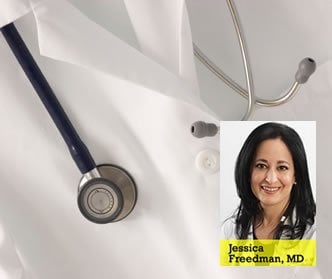“What kind of interview will it be?”
This is not a question applicants ever asked 10 or 15 years ago but often do now. Every year, more medical schools now conduct Multiple Mini Interviews (MMI) while most still conduct “traditional” one-on-one interviews. A few medical schools also conduct group interviews with either groups of students who are interviewed together or several faculty who interview one student together. Therefore, when thinking about the medical school interview process, it’s important to be aware of what you might encounter on the interview trail.
Jessica Freedman
Medical School Application Secondary Essays
You finally submitted your medical school primary application and think you can rest when, starting some time in late June, you start receiving secondary essay prompts—just about every day.
Overwhelmed, you start to wonder why you applied to so many medical schools. Most applicants (except those with exceptional grades, MCATs, and experiences) should apply broadly to a wide range of schools, but doing so translates into writing a whole bunch of secondary essays, which can be daunting.
Getting into Residency: Most Important Factors
How do residency program directors decide whom to interview? And what factors influence how they rank those applicants they do interview? The National Residency Matching Program (NRMP) surveyed residency program directors in 2008 and 2010 about what they consider most important when deciding which applicants to interview and what criteria are most valuable when ranking residency applicants. This survey, an underutilized resource, provides valuable insight and information that can help medical students determine how competitive they are for a given specialty. The data can also empower applicants if they use the information to improve their candidacies.
Here is what the survey showed about 1) what factors influence program directors to offer a residency applicant an interview, presented as the percentage of program directors who considered each factor important, and 2) what specific criteria influence their decision to rank a residency applicant after the interview, using a scale from 1 (not at all important) to 5 (very important).
Caribbean Medical Schools: What to Consider
Dr. Jessica Freedman discusses challenges Caribbean medical students face in obtaining rotation and residency positions.
Personal Statement Myths
You have read every thread on SDN about personal statements, but you still aren’t sure what you should or should not do. A ton of conflicting information is “out there” and whether you are applying to medical school, pharmacy school or anything in between, you need to be aware of some common myths about what you “must” do.
I hear about most of these myths from medical school applicants: “But my advisor said I should NEVER write about that!” “But, my fourth cousin once removed who is in medical school at a top 10 school said I shouldn’t do that.” Like everything else in the medical admissions process, personal statements have few absolutes or formulas so always take such definitive advice with a grain of salt. So, what are some of the myths I hear most often?
Acing Your Residency Interview
Most residency applicants have not found themselves in the interviewee seat since they applied to medical school. Well, the residency interview is somewhat different from the medical school interview. Because you have now nearly graduated from medical school (for the traditional applicant), no one is trying to assess your commitment to medicine; rather, they are specifically evaluating your commitment to the specialty to which you are applying. They also are evaluating your ability to perform well as a resident and if you will be a good fit for their program. This article will provide some tips to help you succeed, whether you are applying to residency this interview season or in the future.
Residency Match Success: Lessons Learned
With medical students starting to think about the upcoming residency match season, it’s a good time to review what residency applicants can do to improve their chances of matching. Many students think that how they write their residency personal statement is all that matters, but this simply is not true. As September looms, I want to focus on factors that are still (for the most part) within the residency applicant’s control. This article should also be useful for anyone who may be entering the match in the future.
- Do away electives
These “audition electives” can really help your chances of matching at a program. Some applicants with whom I speak are often fearful of doing away electives because they believe a less than perfect performance may actually hurt their chances of matching at the program where they rotate. Indeed, this is often not the case. As the associate director of a program, I often found that applicants who demonstrated a solid (or even mediocre) performance when rotating with us were ranked higher than other applicants with slightly better stats. Most program directors would rather take a student whom they know will be a solid, “no-problem” resident than take a risk on someone with whom they have not worked.
Caribbean Medical Schools: A Good Option?
Because the competition for admission to medical schools in the United States is extremely strong, many applicants consider attending medical school in the Caribbean. In fact, a great many bright and talented applicants are now opting to obtain their medical education in the Caribbean.
How can you decide what is the best choice for you? What must you consider in evaluating these schools? And will you be able to obtain a residency in the United States after you graduate? To help you decide if attending a Caribbean medical school is a good choice, this article provides a framework for evaluating these schools and the success of their graduates.
Medical School Admissions: Lessons Learned
AMCAS opens in early May and the next wave of applicants is preparing to submit applications, so it seems apropos to summarize some key observations I have made while privately advising medical school applicants. Here is my list of some essentials for medical school applicants to improve their chances of acceptance.
- Submit an early application
Everything you read tells you that the #1 rule of medical school admissions is to apply early. But, I find that many applicants still ignore this advice. You should not only submit your application as early as possible but also make sure that your transcripts and letters of reference are sent in promptly. - Take your MCAT exam early
Again, the key word here is “early.” Your application will not be reviewed until your pending MCAT scores are in so, if you have worked hard to submit your AMCAS application in June, don’t negate this effort by taking an August MCAT.
Getting Into Residency: Part 2
As the current residency application cycle is winding down, the next wave of applicants is getting ready to apply for the 2009/2010 season. As you begin thinking about your residency application, you should consider who will be writing your letters of recommendation (LORs), how you will talk about your path to residency at your interview, and how you should contact programs and follow up with them (and if this really makes a difference in outcome).
This article serves as a follow-up to the article, “Getting Into Residency: Part 1,” which was published on the Student Doctor Network in October 2008.
Getting Into Residency: Part 1
You were able to get into medical school so you think it will be the same process all over again when you apply for residency. But every application process has nuances and the criteria for selection and how you will be evaluated during interviews is different for residency than it was for medical school.
This two part series discusses the essential ingredients for success, including rotations, written documents, letters of reference, interviews and follow up.
While this article focuses on residency admissions, portions of this piece might also be useful for medical school and fellowship applicants.
Away Rotations and Structuring Your Fourth Year of Medical School
As soon as you have chosen your specialty, you should schedule your away rotations since these slots fill up quickly, especially at top residencies. For programs in which you are especially interested, try to schedule rotations in the summer and early fall of your fourth year to make a good impression before interview season begins.




